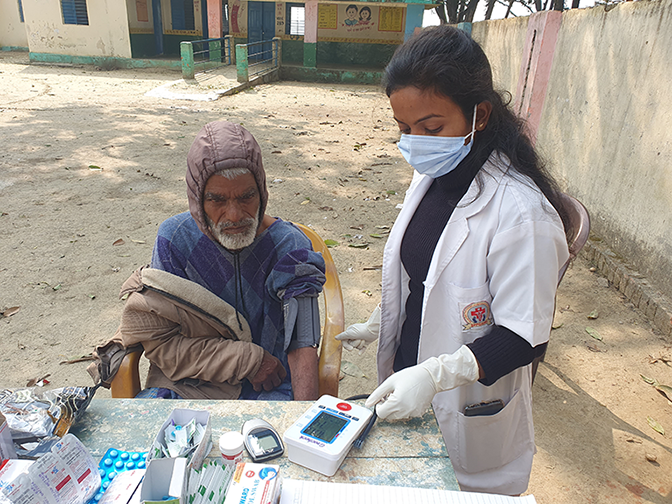Babli Pal’s posting last year to serve as the community health officer in a small health center in the heart of a farming village in Uttar Pradesh presented no end of challenges for a young nurse. Among the most pressing and hefty: convincing an insular, patriarchal community—one situated far from the influence of city hospitals and medical colleges—to prioritize breast and cervical cancer prevention services aligned with global goals.
“[Women] avoid and procrastinate coming to the health center, either denying that they have any problems or hoping for their issues to resolve on their own,” says Pal.
Undaunted, the 28-year-old nurse aims to make quality health services accessible and attractive to women whose low literacy and workload leads them to prioritize farm and family over personal care. She’s also resolved to expand on what constitutes “primary” care.
Her commitment to broadening that concept manifests itself in the practice of teaching women to do regular self-breast examinations; in informing them that most cases of cervical cancer are caused by long-term infection of certain types of human papillomavirus (HPV), a common sexually transmitted infection; and, importantly, in offering a less invasive, more private screening option that involves the self-collection of samples for genetic testing of HPV.
Jhpiego has worked with national and state governments in India to strengthen women’s breast cancer awareness, screening, early diagnosis, and management since 2017, in recent years, adding cervical cancer prevention work.
It was through a Jhpiego-supported training, in partnership with the government of Uttar Pradesh, that Pal learned how to raise awareness about women’s cancers, conduct breast exams, and screen women for oral and cervical cancers.
She feels a sense of urgency given that breast and cervical cancer are the most prevalent cancers among women in India (more than 300,000 new cases and 167,000 deaths in 2020), and especially since the World Health Organization recommends for women age 30-49 (or 25-49 for those living with HIV) to be screened with a high-performance test.
Giving women a sense of ownership and control of their own health care motivates Pal and her team—an auxiliary nurse midwife and eight accredited social health activists (ASHAs)—to go door-to-door, counseling clients and building relationships with husbands, influential elders, and village leaders. These ambitious efforts have resulted so far in 184 women being tested during eight center-based cancer screening sessions, with several being referred for further investigation. Also, ASHAs have distributed kits and provided instructions for HPV self-sampling to women, some of whom were referred to the community health center for treatment.
Delighted to be among 225 health care providers across India to be supported by Jhpiego in screening more than 4,500 women for cervical cancer and conducting clinical breast exams for more than 73,000 women, Pal says, “If a small effort on my part can make a big difference in someone’s life, what can be better than that?”
Reported by Indrani Kashyap, Jhpiego’s India-based associate director of regional communications. Writer-editor Maryalice Yakutchik also contributed to this article. Photos by Shivani Agrawal.

